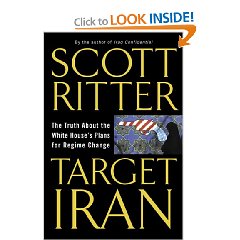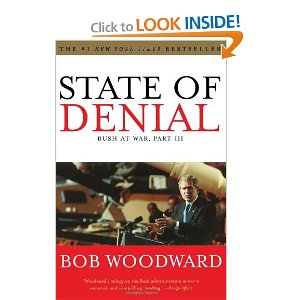
Superb Primer for Any Level, Needs Two Missing Pieces, April 25, 2008
Worldwatch Institute
This a superb edited work that melds chapters (with notes at the end) from world-class authors on a broad range of topics.
I kept this at five stars until the end and then I could not stand it anymore. There are at least five reasons to reduce it to four. Here are the first two.
1. As someone who grew up with Banks & Textor and have created four analytic models in my lifetime, I am growing increasing impatient with the continued fragmentation of research and writing. There is a model available: ten threats (from the UN High Level Threat Panel), twelve policies, eight challengers. We need to start fusing, analyzing, visualizing and discussing all ten threats in relation to all ten policies. I am no longer content to read about water in one chapter, meat in another, and so on. Stop putzing around and create the EarthGame with all information, all languages, all the time–geospatially grounded of course–and let's get on with the task of identifying with precision the global range of gifts table down to the household level, from $1 to $100 million.
2. I am increasingly irritated by the little cabals that strive to cite only themselves, and furthermore, have their own language to distinguish them. “Get the price right” instead of “true cost”? Get over it. Enough already. I am also increasingly of the view that the Notes must be indexed. The notes are good, but when the lead chapter talks about “Adjust Economic Scale” and fails to cite Small Is Beautiful, 25th Anniversary Edition: Economics As If People Mattered: 25 Years Later . . . With Commentaries or Human Scale I growl.
Together with Plan 3.0 and Vital Signs, both linked by another reviewer, this book represents a fine stand-alone study set if you want to limit yourself to the WorldWatch oracles and dismiss all others.
Here is what grabbed me about this book:
+ Opens with utterly sensational four pages of “timeline” for 2007 with little blocks that are priceless. I really like this.
+ Chapter 1 does a fine job of listing:
– Four flawed economic assumptions:
– 1. Independence of economic activity from “infinite” nature
– 2. Growth should be the primary economic objective
– 3. Markets are always superior to governments at allocating resources
– 4. Humans are economic maximizers and place no value on community
This may sound simple but I admire it.
– The seven big ideas for economic reform:
– 1. Adjust economic scale
– 2. Shift from growth to development
– 3. Make prices tell the ecological truth [note: for World Index of Social and Environmental Responsibility–WISER–to not be in index irritates me so much I almost take the fifth star again).
– 4. Account for nature's contributions [I am infuriated by a second hand citation. I am not familiar with more than a couple of books, but to not mention Ecological Economics: Principles And Applications or The Future of Life moves this book, as very good as it is–toward Classic Comics book shallowness.
– 5. Apply the precautionary principle. [Cites a San Francisco Chronicle opinion piece, what happened to the real books on this subject, such as Protecting Public Health and the Environment: Implementing The Precautionary Principle
– 6. Revitalize commons management
– 7. Value women [here I am irritated by the isolation of these authors and their citations from a broader understanding of why we should value women: because it is a proven fact that there is no better investment, dollar for development dollar, than a dollar spend educating women. That ripples through society and impacts on the men big time.]
The second chapter has a prices Figure showing that computer diffusion is growing arithmetically while cell phone diffusion is growing logrithmically plus. My comment: Nokia is slowing beginning to grasp what I told their Chairman a year ago: give the cell phones to the poor free, sell the call, not the phone (and my other idea, educate the poor one cell call at a time, starting with call centers in India and China, and then monetize the transactions. Having six farmers call in asking about the same animal disease is PRICELESS! How governments cannot understand this simple logic is beyond my comprehension.
Across the book the tables and figures are powerful but they are not integrated into a total model (e.g. you should not grow grain with water you cannot afford to create fuel instead of feeding a family when you could run 35 million cars a year on Cuban sugar cane sap).
I was pleasantly surprised to see meat and seafood in its own chapter, but as an avid admirer of everything by Francis Moore Lappe
, see for example Diet for a Small Planet and her most recentDemocracy's Edge: Choosing to Save Our Country by Bringing Democracy to Life.
Toward the end are two very important chapters, one on the financial implications of sustainability (i.e. what alternative vehicles can be used to push back on predatory lending, absentee ownership, and wasteful food practices) and on harnessing human energy (e.g. to plant trees).
I put the book down with irritation–Open Money, Collective Intelligence, even the word Citizen are not in this book–and I again harken to the need for an EarthGame in which all knowledge, all budgets, all citizens, can come together to game, understand, dialog, and decide.
I've come to the conclusion that the fragmentation of the “academy” is now just as dangerous as the desperate failure of our political system in America (see Running On Empty: How The Democratic and Republican Parties Are Bankrupting Our Future and What Americans Can Do About It for the simple reason that if the academy would get its act together and “make sense” to the public, the public will take care of the political fix.
We knew most of this stuff in the 1970's, 1980's, and 1990's–at the academic level–but the politicians were able to ignore us because a) the people were unwitting and b) low gas prices and high Exxon bribes were great for the smokey room crowd. That's over. It's time for the academy to start producing explicit recommendations and budgets, at the zip code level, that we can use to beat politicians into submission or out of office.
Please have it online by 4 July 2008, and thank you for all the wonderful work up to this point. Time to bring this program home.
Two more links that are action oriented:
How to Change the World: Social Entrepreneurs and the Power of New Ideas, Updated Edition
Collective Intelligence: Creating a Prosperous World at Peace










